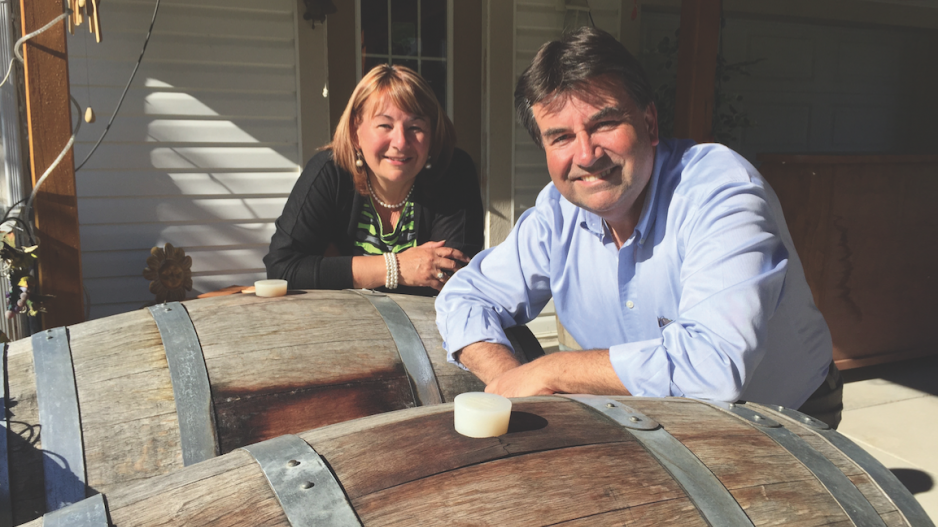Winery owner JAK Meyer is slightly apologetic as he explains that this morning’s interview at his Okanagan Falls vineyard needs to be delayed a bit.
There’s a large snake – it could be a rattler – caught in rolls of bird netting.
He’s tasked with the job of releasing it. He and staffer Simon Bluteau deftly cut it from the tangled netting, see that it’s a large but non-venomous bull snake and it set free in the sagebrush beyond the vineyard fence.
Like most small-winery owners, Meyer is constantly pulled between the immediate tasks at hand and the job of keeping his business, Meyer Family Vineyards, on track. The threat posed by the snake is easily dealt with. Expanding winery sales while keeping abreast of the new B.C. government wine policies – the subject of this day’s interview – takes more effort.
It’s all about having a story to tell, he said of the marketing behind B.C.’s premium wine sector. Each winery is trying to distinguish itself from its neighbours and, at the same time, co-operate with them to distinguish the region from global competitors. They do this by promoting food and wine culture. Meyer is concerned that the province’s drive to introduce wine into supermarkets could undermine years of effort.
Supermarket sales are a double-edged sword, he said. Supermarkets have access to thousands of customers and the ability to dovetail wine sales with food discounts, something no private store can match.
But the stories that make B.C.’s wine sector stand out among its competitors can be lost on a supermarket shelf. Much is at stake, he said.
He’s not alone in his views. Vancouver wine lawyer Mark Hicken said he is advising wineries to keep a close eye on their sales as the province makes the shift in how consumers buy wine. Private stores, which many of the Okanagan wineries rely on to showcase their wines and tell their stories, will face challenges.
“Change is never easy, and if you are a small winery, you should be monitoring this very closely,” Hicken said.
He said supermarkets tend to gravitate to lower-cost wines. In the U.S., wineries are often pressed to offer discounts if they want shelf space in grocery stores.
Meyer’s business plan has anticipated market changes, so he has already diversified his sales channels as a hedge. Other Okanagan wineries are doing the same thing. It’s a three-pronged approach:
•Expand export sales in the U.S., Asia and Europe. Wines from Okanagan’s Blue Mountain Vineyard are available in Seattle. Meyer Family has a specialty label in England’s Marks & Spencer stores.
•Step up the ambience in tasting rooms to encourage wine tourism. At Tinhorn Creek Vineyards in Oliver, a greeter hands visitors a glass of Pinot Gris as they enter a tasting room that has a cocktail party atmosphere.
•Focus on direct-to-consumer sales through wine clubs and website-driven case orders, a more viable option since April, when a New Brunswick court ruled that interprovincial trade barriers to wine are unconstitutional. At Blue Mountain, more than 50% of all sales are direct-to-consumer, with some wines selling out the day they are released.
Farther up the Okanagan Valley, at Summerland’s Saxon Estate Winery, owners Paul and Jayne Graydon welcomed the advent of supermarket sales with no hesitation. They are committed to selling as much of their wine as they can through Save-On-Foods. Saxon makes only 2,000 cases of wine annually, so government liquor stores were difficult to crack.
In the 14 months since B.C. wines carring the Vintners Quality Alliance appellation first appeared in a Save-On-Foods outlet, Saxon’s sales have tripled.
“I don’t know where this is all going to lead to,” Paul Graydon said of the retail landscape. “There is no doubt that change is going to happen, and we are advocates for change. Maybe you will see BC Liquor Stores disappear; maybe some of the private liquor stores will disappear.
“But it is expanding our business and our volume projections as we go forward. We are going to ride the changes as they come.”
@BIVnews




